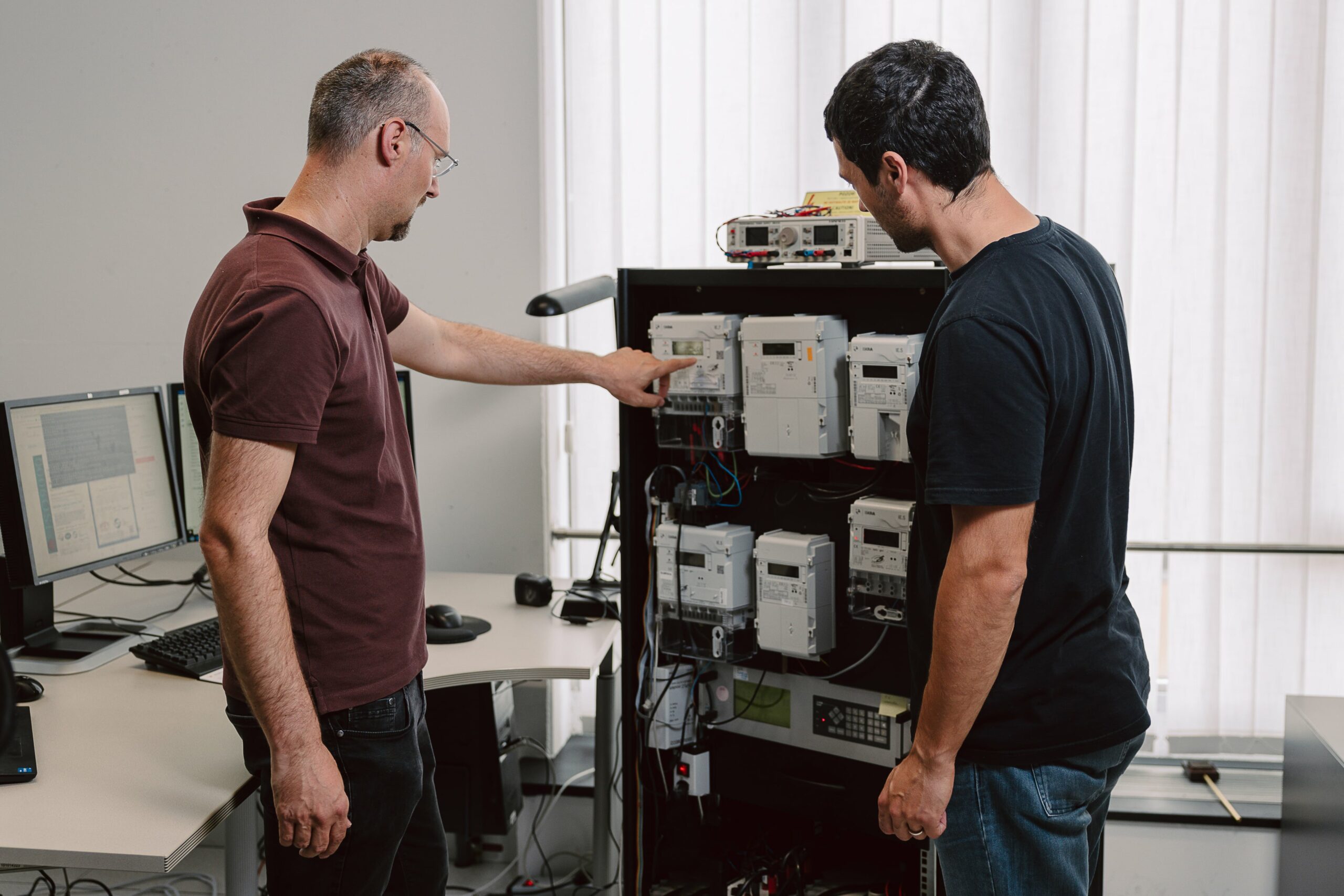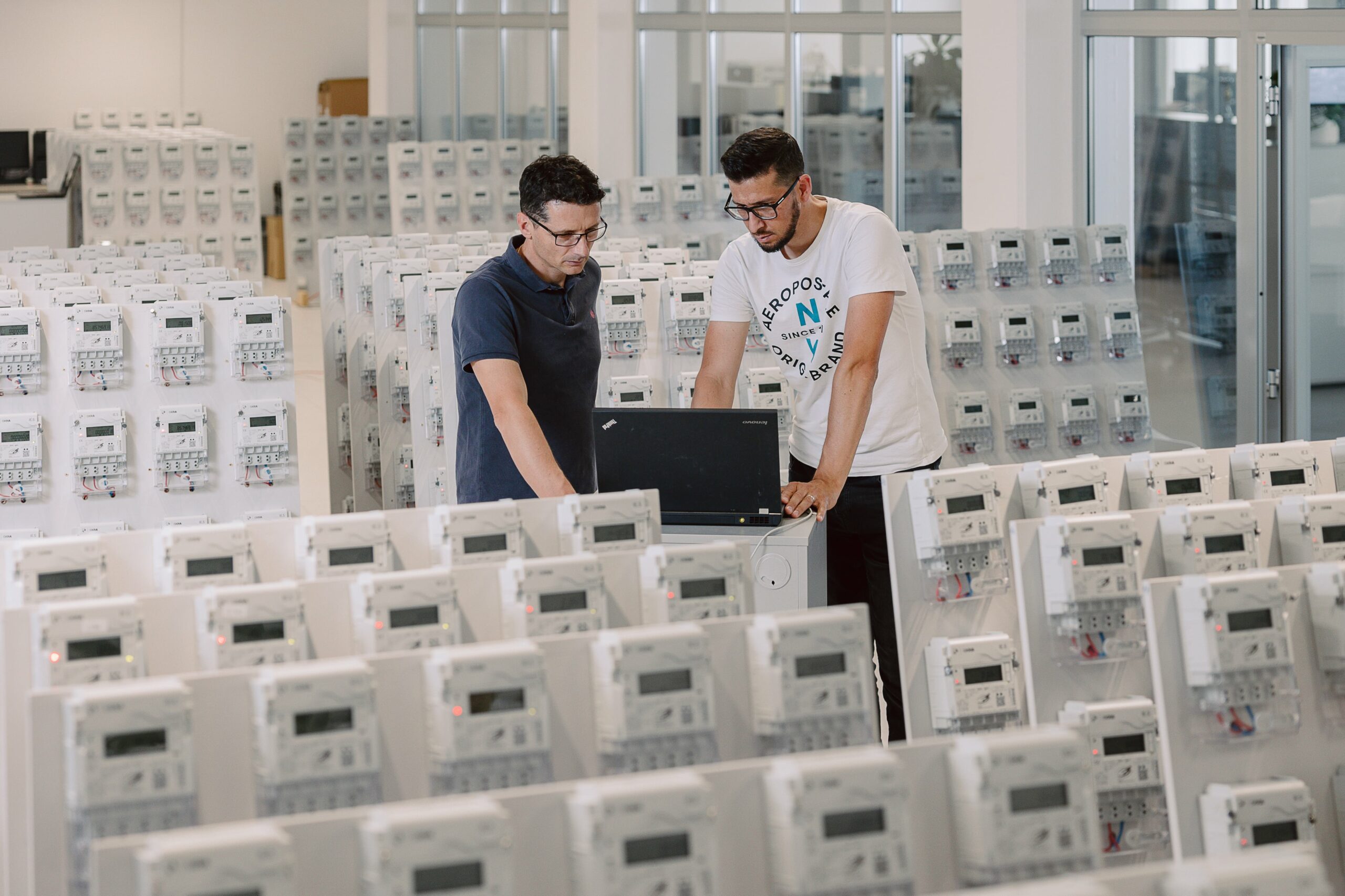Additionally, we introduced calibration and test procedures according to the requirements of international standards and legislation. To achieve high quality laboratory services, we have established a quality system according to the ISO/IEC 17025 standard, which ensures the independence and impartiality of laboratories and the international comparability of test results.
Calibration of reference meters and testing equipment for electricity meters
Calibration of reference meters and testing equipment for electricity meters is the process used to ensure accuracy in measuring electrical energy. This is achieved by regularly checking and adjusting reference meters and testing equipment used to verify the accuracy of electricity meters. This ensures that electricity meters used in industry and households accurately measure electrical energy consumption.
We offer the following services in this field:
- Performing calibrations of reference meters and testing equipment for electricity meters (in accordance with the SIST EN ISO/IEC 17025 standard) with certified international traceability enables customers to use measuring equipment for verification in the field of legal metrology and quality control of measuring equipment in quality assurance processes.
- Providing traceability of calibrations to the international level (PTB, Germany).
- Performing calibrations of standard meters (up to the class of 0.01%) for electrical quantities: power, energy, voltage and current.
- Larger measuring devices are calibrated at the user location.
Measuring Laboratory Iskraemeco is accredited by Slovenian Accreditation with accreditation number LK-007 in the field of calibration (SIST EN ISO/IEC 17025). Scope of LK-007: (Annex to Accreditation Certificate LK-007).
EMC
Electromagnetic compatibility (EMC) is the ability of a unit of equipment to operate correctly in its electromagnetic environment without causing excessive electromagnetic interference with any other equipment in that environment. In general, when establishing electromagnetic compatibility, there are two types of EMC testing:
- Electromagnetic emissions determines how much electromagnetic disturbances the device itself generates and emits in the environment.
- Electromagnetic immunity testing determines how well the device performs in the presence of electromagnetic disturbances.
- EMC electromagnetic compatibility testing activity.
In most markets, having an EMC certification is a requirement that must be met. Companies must achieve regulatory requirements, improve product performance, and reduce the risk of costly non-compliance to strengthening their position in the market. EMC is therefore vital for businesses. We test electronic products for immunity to interference and measure the radio frequency interference they emit. Superior equipment enables testing with above-standard levels of interfering signals.
We offer the following services in this field:
- Performing EMC tests in accordance with the SIST EN ISO/ IEC 17025 standard and the requirements of product standards.
Set of EMC test:
- Resistance to conductively coupled electro-magnetic interference.
- Resistance to radiated electromagnetic interference.
- Measurement of radio frequency interference emissions.
Measuring Laboratory Iskraemeco is accredited by Slovenian Accreditation with accreditation number LP-054 in the field of testing (SIST EN ISO/IEC 17025). Scope of LP-054: (Annex to Accreditation Certificate LP-054).
RF performance
Measuring Total Radiated Power and Total Isotropic Sensitivity is crucial in testing wireless mobile technology devices. Total Radiated Power measures the amount of electromagnetic energy that a device emits, while Total Isotropic Sensitivity measures the device’s sensitivity to receiving electromagnetic waves from all directions. These measurements help ensure efficient and reliable operation of wireless devices and compliance with electromagnetic compatibility standards and regulations.
We offer the following services in this field for mobile technologies GSM, GPRS, EDGE, CDMA, LTE, LTE-M1, NB-IoT:
- Measuring TRP: Total Radiated Power.
- Measuring TIS: Total Isotropic Sensitivity.
Product reliability
Product reliability refers to the ability of a product to operate as intended under specific conditions and for a certain duration of time. It is a measure of the product’s quality and consistency in meeting the customer’s expectations. Product reliability can be evaluated using various methods such as reliability analysis, testing, and simulations. Ensuring product reliability is essential to avoid potential failures that could lead to customer dissatisfaction, loss of company reputation, and financial losses.
We offer the following services in this field:
- Calculations of the failure rate of electronic devices in accordance with the standards.
- Carrying out tests of accelerated ageing of electricity metering equipment and evaluation of results.
- Testing the stability of meteorological characteristics of electricity meters at the upper limits of the operating range of temperature, voltage and current for a longer period.






